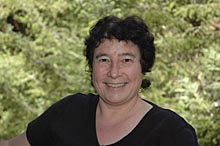A new study has produced an unusually intimate portrait of the college experience for UCSC students from underrepresented groups, including those who are among the first in their family to attend college.
Although the majority of students interviewed made the transition to college life with relative ease, for those who struggled, friendships and the support of key individuals--often UCSC staff members--appeared to play a critical role in their long-term success, according to psychology professor Margarita Azmitia.
The first-of-its-kind study traced the paths of 175 undergraduates from underrepresented groups and educationally disadvantaged backgrounds from fall 2003 through last spring. The findings are based on annual written surveys and five in-depth in-person interviews conducted with participants.
During their first quarter at UCSC, about two-thirds of study participants made the transition to college relatively seamlessly, but one-third experienced feelings of isolation and self-doubt, said Azmitia. The majority of those students were able to "find their niche" by spring, but about 40 students of the original 175 did not return for their sophomore year.
Some students left to study at a different campus, to pursue a major not offered here, or because of financial difficulties, said Azmitia, whose research focuses on adolescent life transitions, while others struggled with homesickness and feeling like "they didn't fit in."
"They think they can't make friends. They don't know how to 'do' college," said Azmitia. "We tend to think students leave because they aren't doing well academically, but it turns out that grades predict very little. For students, finding a niche turns out to be very important."
About three-quarters of the students interviewed came from groups that are typically underrepresented in the UC system (African American, Latino/Chicano, Filipino, Native American, and low-income white students who are the first in their family to go to college).
Over the course of their first year, most students found friends and made connections with key individuals--often residential assistants in dorms, college advisers, and supportive staff members, said Azmitia. "The colleges and staff at this university are amazing," she said. "They seek them out and get them services, support, and the appointments they need."
On campus, several service providers have modified their programs in response to the study's findings, including the Educational Opportunity Program (EOP), Learning Support Services, the Academic Resources Collaborative (ARC), and the colleges. The fall EOP orientation, which used to be optional, is now mandatory, and students are required to meet with their EOP advisers during their first year. Support services now accommodate the schedules of working students and are promoted during winter quarter, as well as fall quarter. Finally, college and department advisers work more closely with ARC to make sure students don't fall through the cracks, and they consult when necessary with parents.
"We learned from the surveys that a lot of students weren't aware of academic support services, tutors, and that kind of thing," said Azmitia. "Most students go to fall orientation, but some don't, so the campus is trying to reach them. Many students said they were more ready to take advantage of services during their second quarter."
The fine-grained data generated by the study are particularly valuable as budget constraints threaten outreach efforts and campuses focus on retaining enrolled students, said Azmitia. The study is described in a chapter entitled "Affirmative Action and Ethnic Minority University Students," that appears in the new book Social Development, Social Inequalities, and Social Justice (New York: Lawrence Erlbaum Associates, 2008). Azmitia and psychology professor Faye Crosby coauthored the article with graduate student Kristina Schmukler and alumus Joel Gills, both of psychology.
Although the majority of underrepresented students in the study graduated in four years, Azmitia noted two other trends: Some coped with the financial stress of college by taking heavy course loads and graduating in three years, while "too large a portion" stayed five or six years, jeopardizing their ability to actually finish because many didn't realize they must petition for permission to extend their studies beyond four years.
Azmitia, who interviewed about two-thirds of the seniors in the study, said the study has sensitized her to the needs of students. She recalled the experiences of an 18-year-old African American man whose father died when he was a child and whose mother hadn't finished high school.
"He was determined to make it, even though he said he was often the only black student in his classes," said Azmitia. "It has changed my teaching a lot. Students mentioned things that really made me think. To hear their stories and what they're dealing with at 18--poverty, death, illness--it has made me very careful about my own perceptions and stereotypes."



